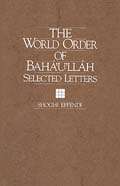World Order of Baháʼu'lláh
The World Order of Baháʼu'lláh [1] is a collection of letters and messages from Shoghi Effendi, head of the Baháʼí Faith during the period, first published in 1938.
| Texts and scriptures of the Baháʼí Faith |
|---|
  |
| From the Báb |
| From Baháʼu'lláh |
| From ʻAbdu'l-Bahá |
| From Shoghi Effendi |
While the letters to the American Baháʼí community from Shoghi Effendi between 1922 and 1929, published under the title of Baháʼí Administration, explained and encouraged the development of the administrative institutions created by Baháʼu'lláh and further elaborated by ʻAbdu'l-Bahá, the letters published in The World Order of Baháʼu'lláh have a different aim and a far larger scope. These later communications unfold a clear vision of the relation between the Baháʼí community and the entire process of social evolution under the dispensation of Baháʼu'lláh. The distinction between the Baháʼí community and the sects and congregations of former religions had been made apparent, but the present volume establishes the Baha'i Administrative Order as the nucleus and pattern of the world civilization emerging.
In the introduction, Horace Holley, a notable Hand of the Cause wrote:
In light of the existing international chaos, they reveal the most significant Truth of this era, namely that the old conception of religion, which separated spirituality from the fundamental functions of civilization, compelling men to abide by conflicting principles of faith, of politics and of economics, has been forever destroyed.
In the section entitled "Unity in Diversity", Shoghi Effendi described underlying principles of the Baha'i Faith,[2]
Let there be no misgivings as to the animating purpose of the world-wide Law of Baháʼu'lláh. Far from aiming at the subversion of the existing foundations of society, it seeks to broaden its basis, to remold its institutions in a manner consonant with the needs of an ever-changing world. It can conflict with no legitimate allegiances, nor can it undermine essential loyalties. Its purpose is neither to stifle the flame of a sane and intelligent patriotism in men's hearts, nor to abolish the system of national autonomy so essential if the evils of excessive centralization are to be avoided. It does not ignore, nor does it attempt to suppress, the diversity of ethnical origins, of climate, of history, of language and tradition, of thought and habit, that differentiate the peoples and nations of the world. It calls for a wider loyalty, for a larger aspiration than any that has animated the human race. It insists upon the subordination of national impulses and interests to the imperative claims of a unified world. It repudiates excessive centralization on one hand, and disclaims all attempts at uniformity on the other. Its watchword is unity in diversity...(Effendi 1938:41-42).
Contents
- World Order of Baháʼu'lláh (letter)
- World Order of Baháʼu'lláh: Further Considerations
- Goal of a New World Order
- Golden Age of the Cause of Baháʼu'lláh
- America and the Most Great Peace
- Dispensation of Baháʼu'lláh
- Baháʼu'lláh
- The Báb
- ʻAbdu'l‑Bahá
- The Administrative Order
- Unfoldment of World Civilization
See also
References
- Effendi, Shoghi (1938). The World Order of Baháʼu'lláh. Wilmette, Illinois, USA: Baháʼí Publishing Trust. ISBN 0-87743-231-7.
- Effendi, Shoghi (1938). "Unity in Diversity". World Order of Baháʼu'lláh. Wilmette, Illinois, USA: Baháʼí Publishing Trust. pp. 41–42. ISBN 0-87743-231-7. Retrieved February 14, 2012.
Further reading
- Effendi, Shoghi (ed. Universal House of Justice, 1977). Call to the Nations. Compilation of selections from the writings of Shoghi Effendi chosen by the Universal House of Justice, mostly from World Order of Baháʼu'lláh, offered as "a light and a guidance to all mankind".
- Nakhjavání, Alí (2005). Towards World Order. Baha'i Publications Australia. ISBN 1-876322-93-4.
- Naghdy, Fazel (2012). A Tutorial on the Dispensation of Baha'u'llah: Exploring the Fundamental Verities of the Baha'i Faith. CreateSpace Independent Publishing Platform. ISBN 1468145312.
- Related documents on Baháʼí Library Online